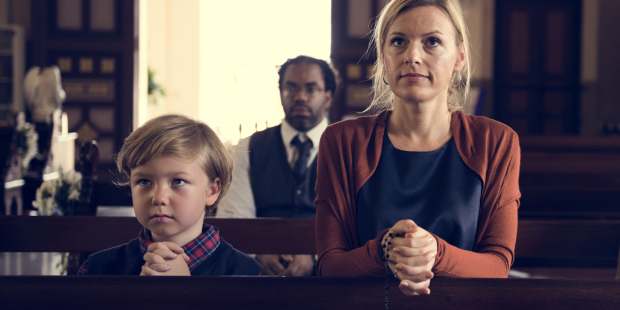The physical posture is an ancient one, used by Christians since the very beginning.
For Roman Catholics, kneeling is one of the most distinctive physical gestures of prayer during the celebration of Mass. In fact, for many centuries the lay faithful of the Roman Rite would kneel for almost the entire duration of Mass.
Why is that?
While it’s true that standing during prayer was a common posture of the early Christians (and is currently maintained by many Eastern Christians during the Divine Liturgy), kneeling was also part of early Christian tradition.
According to Cardinal Joseph Ratzinger (Pope Benedict XVI), kneeling was something highly disfavored by both Greek and Roman culture. Ratzinger writes in his book Spirit of the Liturgy, “If we look at history, we can see that the Greeks and Romans rejected kneeling … kneeling was unworthy of a free man, unsuitable for the culture of Greece, something the barbarians went in for. Plutarch and Theophrastus regarded kneeling as an expression of superstition … Aristotle called it a barbaric form of behavior.”
Ratzinger claimed that, “Kneeling does not come from any culture — it comes from the Bible and its knowledge of God.” In particular, “Saint Luke, who in his whole work (both the Gospel and the Acts of the Apostles) is in a special way the theologian of kneeling prayer, tells us that Jesus prayed on His knees. This prayer, the prayer by which Jesus enters into His Passion, is an example for us.”
Catholics kneel because Jesus kneeled during prayer.
Additionally, kneeling is typically seen in the Gospels as a way to express supplication and adoration. Often in the New Testament kneeling is preceded by an act of faith, “I do believe, Lord,” and completed by an act of adoration at the majesty of God (cf. John 9:35-38).
Elsewhere, like in many of the healing narratives, the person is presented kneeling in supplication, asking to be healed.
For these reasons the Roman Rite instructs the faithful to kneel during Mass specifically when Jesus is made present on the altar. According to the General Instruction of the Roman Missal, “In the Dioceses of the United States of America, [the faithful] should kneel beginning after the singing or recitation of the Sanctus (Holy, Holy, Holy) until after the Amen of the Eucharistic Prayer.”
This physical posture is meant to express a spiritual attitude of adoration before the triune God, truly and substantially present in the Holy Eucharist. It is an act of humility, recognizing our own littleness before the Creator of the world. The act of kneeling prepares our hearts to receive God within our souls, striking down our pride with a physical reminder of what our soul should be like spiritually.
In this way, kneeling in the context of the Roman liturgy is directly tied to Jesus’ presence in the Eucharist.
While not officially part of the Rite, it is a common custom in some churches to maintain a kneeling posture until the consecrated hosts are placed back within the tabernacle.
Kneeling during Mass is an ancient posture, one that expresses a deep spiritual truth that is connected to the Real Presence of Jesus on the altar.
